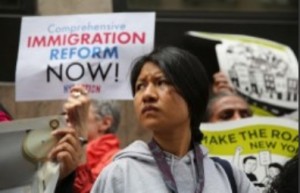
UNITED STATES, New York : NEW YORK, NY – JUNE 14: Immigration reform advocates stage a demonstration, organized by the New York Immigration Coalition, outside a detention facility run by Immigration and Customs Enforcement (ICE) on June 14, 2013 in New York City. Demonstrators staged the event ahead of Fathers’ Day to draw attention to the thousands of undocumented immigrant fathers deported by ICE and separated from their families in the United States. John Moore/Getty Images/AFP
WASHINGTON—A US immigration overhaul would cut hundreds of billions of dollars from the federal deficit over the next 20 years if it gets through Congress, congressional budget analysts said.
Tuesday’s assessment cheered supporters of an issue that President Barack Obama has placed at the top of his domestic agenda. They said it would add to momentum behind a measure that toughens border security while holding out the hope of citizenship to millions who came to the United States illegally or overstayed their visas.
About eight million immigrants living unlawfully in the US would initially gain legal status under the sweeping legislation moving toward a vote in the Senate, the eagerly awaited analysis by the Congressional Budget Office said.
Immigration has become a top national issue once again after opposition Republicans lost last year’s presidential election as Hispanic voters voted overwhelmingly for Obama, wary of the conservative Republican focus on deportations.
The new report said the immigration legislation would increase federal spending in the form of benefits for those gaining legal status, but those expenses would be more than offset by a rise in the labor force, increasing revenues. Not all of the forecast was favorable, though. The report said average wages would decline through 2025 as a result of the bill, and that unemployment would go up slightly.
The report said deficits would fall by $197 billion across a decade, and by $700 billion in the following 10 years if the bill becomes law.
The White House quickly issued a statement saying the report was “more proof that bipartisan commonsense immigration reform will be good for economic growth and deficit reduction.”
Meanwhile on Tuesday, the Senate moved ahead on a sweeping, bipartisan measure that Obama supports. It appears on track for a final vote there as early as July 4.
The assessment came as the pace of activity increased at both ends of the Capitol on immigration legislation.
Challenged by protesters chanting “shame, shame,” Republicans in the House of Representatives advanced legislation to crack down on immigrants living illegally in the United States, at the same time the Senate lurched ahead on a dramatically different approach offering the hope of citizenship to the same millions.
Republican Rep. Trey Gowdy of South Carolina said the bill approved by the House Judiciary Committee was part of a “step by step, increment by increment” approach to immigration, an issue that can pit Republican against Republican as much if not more than it divides the two political parties. The legislation was agreed to on a party-line vote of 20-15 late Tuesday.
California Democratic Rep. Zoe Lofgren predicted there would be “millions of American citizens taking to the street” in protest if Republicans pressed ahead with the bill. The measure permits state and local authorities to enforce federal immigration laws and requires mandatory detention for anyone in the country illegally who is convicted of drunk driving.
In the Senate, a bipartisan bill that Obama supports appears on track for a final Senate vote as early as July 4.
In a series of votes during the day, the Senate rejected a proposal to require the installation of 350 miles (560 kilometers) of fencing along the US-Mexico border before legalization can begin for anyone currently in the United States illegally.
The Senate also rejected a proposal to prevent legalization until a biometric system is in place to track people entering or leaving the US through air, sea or land points of departure.
Republicans generally want to toughen the measure, particularly since the bill includes a 13-year path to citizenship for immigrants in the country illegally.
The measure was drafted by a bipartisan Gang of Eight and represents a series of political trade-offs among senators as well as outside groups like business and labor, growers and farm workers.
In addition to border security and a path to citizenship, the measure includes an expanded number of visas for highly skilled workers prized by the technology industry and a new program for low-skilled workers. It also features a top-to-bottom overhaul of a decades-old system for parceling out visas to future legal immigrants, reducing the importance of family ties while emphasizing education, job skills and youth.
In the House of Representatives, Republicans advanced legislation to crack down on immigrants.